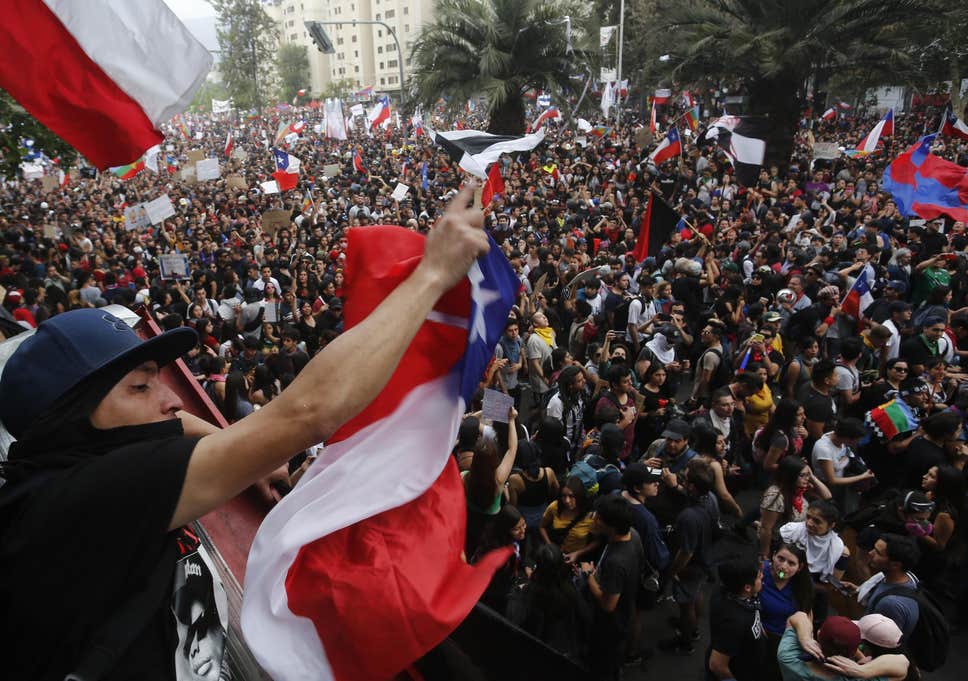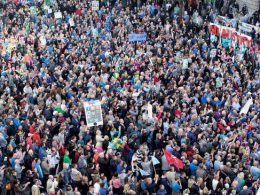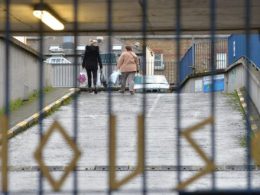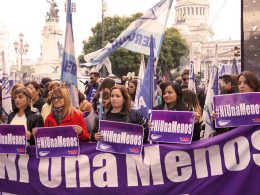Just weeks ago, right-wing President Piñera was declaring in the media that Chile was an oasis in Latin America and the IMF was praising its merits. But when he announced a 30 pesos (about 5 euro cents) increase in the fee for a metro ticket, thousands of young people from secondary schools organised massive protests. The youth ‘invaded’ the metro stations and opened the gates. Mass demonstrations, and now a general strike, are continuing across the country – the anger increased following the government’s decision to use live weapons – shooting hundreds.
By Pablo Nyns, PSL/LSP (CWI in Belgium)
In a country where a majority of workers earn less than €500 per month and where a metro ticket costs €1, a 30 peso increase is unbearable for many. Transport already absorbs on average of 15% of the income of Chilean working class families. However, as the demonstrators state, the revolt is not only against this increase, but against the politics of the last 30 years, since the return to ‘democracy’.
Over these 30 years, all traditional parties of both left and right have made empty promises to implement both social and democratic reforms. The constitution, inherited from the Pinochet dictatorship is still largely in force. Pinochet and his regime created a training ground for global neoliberalism, and over the last three decades, these policies have continued. All essential services, including water, transport, education, healthcare and pensions have been privatised. Chile is one of the most unequal countries in the world – just 1% of the population controls a third of the country’s income.
Following the harsh police repression against young people, mass demonstrations involving students and workers gradually began to take place in the capital, Santiago, and then throughout the country. While the government tries to pretend that the demonstrations are “over”, they continue to grow.
Chile has experienced many struggles by students over the past decade, particularly in 2006 and 2011 when they protested in favour of free education. This has forged a fighting consciousness among Chilean youth. The older generations who still remember the abuses of the military dictatorship against the militants were enthused by the new generations and have been returning to the struggle. As a popular slogan in the country now says: “We are no longer afraid”.
Initially, there were reports of destruction and looting. In most cases they targeted large supermarkets, banks, metro stations or motorway toll-gates. Gradually, as the demonstrations grew larger, looting became marginal. It was also strongly condemned by the demonstrators, who often considered these actions to be provocations by the police and army to turn public opinion against the protests. In addition, barricades and blockades were organized, particularly in regional cities.
On Friday 18 October, the main Chilean dockworkers’ union, the Union Portuaria de Chile, decided to strike, calling for a general strike. The government of Sebastián Piñera, feeling that it was losing control of the situation, announced the same day, at midnight, that it would freeze the increase in price of metro tickets. But at the same time it declared a state of emergency in the capital.
This restricts fundamental democratic rights such as freedom of assembly. Such a step had not been taken since the return of “democracy”, after Pinochet’s dictatorship. In addition, Piñera introduced a curfew from 7pm to 6am and sent the army out onto the streets with permission to arrest anyone or to use firearms to suppress the revolt. According to official figures, 18 people have died to date. Several hundred have been injured and 2500 arrested. There are also cases of torture and rape.
The use of the military and curfew against demonstrators has been a huge shock. Immediately, people associated these actions with those of the dictatorship and this acted as a catalyst for an even stronger and more determined mobilization, as the government became weaker and more uncertain. The teacher’s union came out on strike, as did the largest private mine in the world. The Mapuche indigenous organizations have joined the movement. Thirty Chilean social and trade union organizations called for a 48-hour general strike on October 23 and 24. These organisations included the campaign against private pensions and the feminist coordination for 8 March. In short, all those sectors that have been in struggle over recent years are organizing to join the fight.
Since then, we have seen the largest demonstrations ever in Chile. Friday 26 October saw 1.5 million on the streets of Santiago and tens of thousands on the streets of coastal cities such as Valparaiso and Viña Del Mar. Even in the wealthier districts, the revolt rumbles and the songs of the revolutionary Victor Jara, killed by the Pinochet dictatorship, echo during curfew nights. His song “El derecho de vivir en paz” (The right to live in peace) has been adopted by the movement in response to the claims of the president, that he is “at war”.
Faced with such a force, the government is being forced to back down and ask for forgiveness. Piñera now promises to increase the basic pension by 20%, the minimum monthly income to 350,000 pesos, to reduce the price of medicines, freeze the increase in electricity prices and lower the salaries of parliamentarians. In addition, the government is trying to build “national unity” with the opposition parties.
But it is far too little too late for the Chilean workers and youth. Piñera is now completely discredited – the main demands of the movement are that he should resign and the troops withdrawn from the streets. A major demand of the movement is the creation of a constituent assembly to draw up plans to end Pinochet’s neoliberal constitution.
We believe that a free and sovereign revolutionary constituent assembly must be a key demand. The general strike must continue, expand and be organised. The first meetings and coordination committees are getting organised. This must be the priority in all schools, workplaces and neighbourhoods so that the movement can structure itself democratically from the bottom up without union bureaucrats or political careerists trying to determine how the movement continues to develop. There should be appeals to the troops and police not to act against the demonstrators, but more importantly coordination committees and trade unions should establish the organised defence of the protests.
This needs to be a movement to bring down the government, to end neoliberal policies and to set up a Revolutionary Constituent Assembly of workers and people. This will be the basis to rebuild Chile with an anti-capitalist and socialist government!
Puerto Rico, Ecuador, Haiti, Chile, … The popular rebellion and workers struggle is spreading through the whole continent. We must unite these struggles and fight for a common alternative to the capitalist system in crisis: for a democratic and socialist federation of Latin America.












